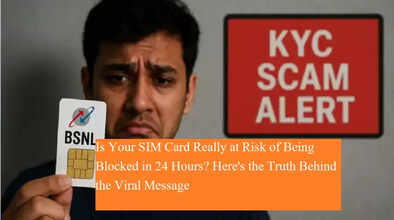Is Your SIM Card Really at Risk of Being Blocked in 24 Hours? Here's the Truth Behind the Viral Message

New Delhi – A concerning message is making rounds on social media, claiming that BSNL SIM cards will be blocked within 24 hours due to a KYC suspension order from TRAI (Telecom Regulatory Authority of India). The notice, which appears to be official with TRAI and BSNL logos, warns users to immediately verify their KYC or risk losing their mobile connection. However, this viral notice is fake and has been debunked by PBI Fact Check.
With the rise in digital scams and cyber fraud, this fake notification is yet another example of how scammers prey on fear and urgency to manipulate unsuspecting users. Here's a detailed breakdown of what the message says, why it’s false, and how you can protect yourself.
What Does the Fake Message Claim?
The viral image circulating on platforms like WhatsApp, Facebook, and Instagram includes a formal-looking notice. It states that “as per TRAI’s directive, all BSNL SIMs without proper KYC verification will be blocked within 24 hours.” The message goes further to include the name and contact number of a so-called "KYC Executive," encouraging recipients to immediately call for verification.
At first glance, the notice looks authentic, mainly because of the use of official logos and formal language. It exploits the ongoing awareness around digital KYC requirements and the fear of losing mobile connectivity.
Why the Notice is Fake
PBI Fact Check—an initiative by the Government of India to curb fake news—has officially declared this message a scam. On its verified X (formerly Twitter) handle, PBI issued a clear warning to the public: “The viral notice regarding BSNL SIM blocking due to KYC suspension is fake. No such directive has been issued by TRAI or BSNL. Do not call the numbers mentioned or share personal information.”
Furthermore, BSNL has not released any such warning or initiated a mass deactivation campaign linked to KYC. Any official communication from BSNL would be delivered via SMS from verified sender IDs, emails from the domain "@bsnl.in", or through its official website and customer service channels.
The Real Danger Behind the Scam
The real motive behind this fake notice is to trap users into calling the given number, where scammers may attempt to extract personal details, including banking credentials. Often, such conversations lead to users being tricked into downloading remote access apps, sharing OTPs, or transferring money.
Such scams have become increasingly common, targeting people’s anxiety and lack of digital awareness. A single mistake, like clicking a malicious link or calling a fake helpline, can result in identity theft or financial loss.
How to Stay Safe
-
Do not call or respond to any unknown numbers or links mentioned in suspicious messages.
-
Verify information through BSNL’s official channels or customer support.
-
Follow updates from PBI Fact Check and other government-verified handles for warnings on ongoing scams.
-
Educate others, especially elderly family members, about such fraud tactics.
-
Enable call blocking and report spam messages to the telecom provider.
Final Word
Scammers are constantly evolving their strategies to look more legitimate and target vulnerable users. Always remember that no telecom provider, including BSNL, will ever ask you to share personal information or banking details over a random call or message.
If you receive such a notice, don’t panic. Simply ignore it and report it to cybercrime authorities if needed. Stay vigilant, and never let fear drive your digital decisions.

